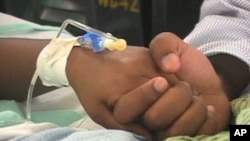Kenya's health-care system has little more than half of the blood supply it needs for transfusions, often resulting in only the most urgent cases being taken care of. Blood comes primarily from school-aged children, patients' relatives, and even from patients themselves. Less than 10 percent of adult Kenyans donate blood. The National Blood Transfusion Services says a big reason for this is because of fears among potential donors that they would find out their HIV status.
The emergencies are there, but the life-saving blood may not be.
Kenya's National Blood Transfusion Services estimates the country needs 200-thousand units of blood per year, to deal with illnesses, surgeries, accidents and other medical conditions.
But from the time the organization was established in 2001, the supply has sometimes been as low as 40,000 units. The most blood Kenya has ever had on hand is 130,000 units, a little more than half the target amount.
Dr. Walter Mwanda is head of blood transfusion services at Kenyatta National Hospital, Kenya's largest public health care facility. He says blood shortages have a significant impact on medical procedures at his hospital.
"We leave the [small number of] units that there are for real, real, real [serious] cases," said Dr. Mwanda. "So the first thing, I must admit, suffers is surgery: elective surgery. Stop."
Dr. Mwanda says elective surgeries that require blood are triaged on the basis of urgency. Patients undergoing long-term elective surgeries are advised to donate their own blood, a practice Dr. Mwanda says accounts for a significant percentage of the hospital's surgery blood supply.
Another major source of blood comes from the relatives of those who need the blood.
One such donor is university student Victor Joseph Oluoch. He's supplying blood for his sister-in-law, who suffers from kidney complications.
"People did not accept to donate blood for her, so we had to volunteer as family members. The whole group that is donating to her is just from our family," said Oluoch.
Oluoch gives one reason for peoples' reluctance to donate blood.
"Some people believe that the blood they donate, the hospitals go ahead to sell them to other people. They feel that there is no need of donating - it is like they are donating their blood for commercial purposes," he explained.
Almost all of the blood collected by the National Blood Transfusion Services comes from high school and university students between the ages of 17 and 25.
Fewer than 10 percent of adult Kenyans donate blood to the blood bank, says Dr. Margaret Oduor, national director of the National Blood Transfusion Services.
"Most people are not comfortable with the fact that, at the end of it you will test their blood and give them their HIV [status]," explained Dr. Oduor. "They are saying they would rather not know it that way, and that keeps them back. Because they are coming forward to give you blood, but at the end of it they may end up with bad news that they were not prepared for."
Dr. Oduor says in reality, only 1.3 percent of the blood collected is found to be HIV-positive. Of the blood that has to be destroyed, almost half is caused by the presence of Hepatitis B, Hepatitis C, and syphilis, while the other half is due to problems in the collection process.
She and other health-care professionals urge Kenyans to get tested for HIV/AIDS in one of the many Volunteer Counseling and Testing Centers (VCTs).
"We are encouraging people who have gone to the VCTs and have known their status - because that fear has been removed - to come forward now to us and give us blood," added Dr. Oduor.
Health care professionals in Kenya are also pushing for what they call a structured donor system that involves regular education campaigns, blood drives, and mobile donor clinics to reach office workers and people living in rural areas.




